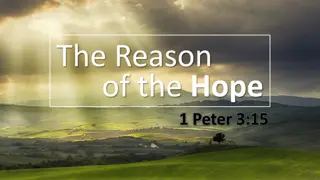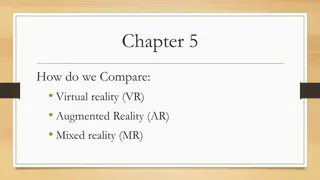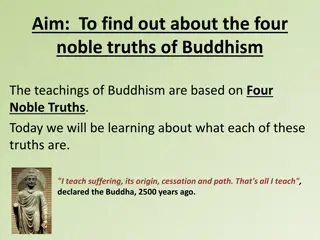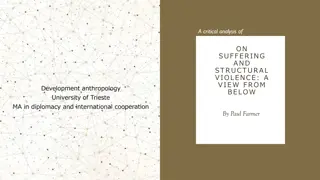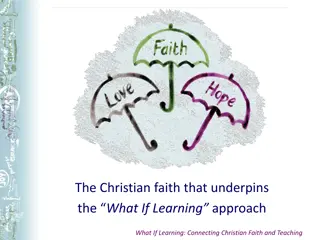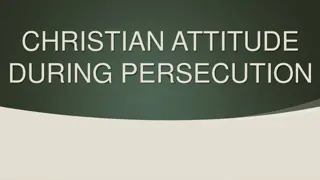The Reality of Hope and Suffering in the Christian Life
Christian life entails the dual realities of hope in our eternal heavenly home and suffering in this earthly existence. Suffering includes tribulations, persecution, and pain, while love is emphasized as central to the Christian journey, rooted in sincerity, goodness, and familial affection.
Download Presentation

Please find below an Image/Link to download the presentation.
The content on the website is provided AS IS for your information and personal use only. It may not be sold, licensed, or shared on other websites without obtaining consent from the author.If you encounter any issues during the download, it is possible that the publisher has removed the file from their server.
You are allowed to download the files provided on this website for personal or commercial use, subject to the condition that they are used lawfully. All files are the property of their respective owners.
The content on the website is provided AS IS for your information and personal use only. It may not be sold, licensed, or shared on other websites without obtaining consent from the author.
E N D
Presentation Transcript
Hope and suffering are two constant realities in the Christian life. Suffering in this earthly life is a reality of Christian experience, and hope in our eternal heavenly home is a reality of Christian faith.
1 Pressure In Romans 12:12, Paul uses the word thlipsis, trans. tribulation Derived from crush, compress, squeeze or break Not mild discomfort, but great, crushing difficulties As a heavy weight on chest pressing the very life from us
2 Persecution Persecution normal for early Christians, scars badges of honour Persecutors or diokontas (v.14) hunted down Christians Such persecution normal for many Christians around world today They know they say goodbye to earthly comfort and security when they decide to follow Jesus Even without persecution, disciples of Christ are misfits in mainstream society If we don t feel a bit alien and out of place in the world are we really following Christ?
3 Pain Suffering can bring pain and weeping (v.15) Not everyone is persecuted but physical, mental and emotional pain is common to human existence This year Covid-19 traversed the whole planet causing sickness, death, loss of livelihoods, fear and anxiety on a global scale. Adding to the suffering of us all.
1 Love: sincerity of love v.9 Love is central to Christian life Our love must be genuine: with no playacting or ulterior motive
1 Love: goodness of love v.9 We must love what is good Which comes with an intense hatred of evil As we turn in revulsion from evil we must turn to what is good: morally, spiritually and savingly We hold firmly to it as if superglued to it
1 Love: family basis of love v.10 Paul uses a word in v.10 found nowhere else in New Testament: philostorgos This is a deep, tender, heartfelt affection that close relatives naturally have for one another Philostorgos also carries idea that love is shown in practical acts of generosity
1 Love: honouring each other in love v.10 Not only must we love one another, we must honour one another Paul says strive to be the first to honour another believer who deserves it As if trying to outdo each other in showing respect and esteem
1 Love: love for enemies v.10 Not only must we love one another, we must honour one another Paul says strive to be the first to honour another believer who deserves it As if trying to outdo each other in showing respect and esteem
2 Hope v.12 Paul commands us to rejoice in hope Hope has a specific meaning in the Bible: used objectively to mean a situation for which we hope The fulfilment of all God s promises is salvation, when we shall be free of the unsatisfied needs and wants of this life, and from sin Hope also used subjectively in the Bible to mean the confident assurance and sure expectation of these things God has promised will be ours But how can we rejoice in hope during suffering or tribulation?
2 Hope: character We can rejoice in our sufferings because of the fruit of that will be produced in our characters (Romans 5:4)
2 Hope: counted worthy The apostles rejoiced that they had been counted worthy to be disgraced for Christ (Acts 5:41) Through all the centuries believers have rejoiced in the honour of suffering for their Lord
2 Hope: Christ In his letter to the Philippians, Paul (who was a prisoner at the time) commanded, Rejoice in the Lord always Whatever our outward circumstances, when we turn our thoughts to Jesus, how much cause there is to fill our hearts with joy
3 Patience Paul writes that we must be patient This is a positive and active response, not passive endurance It is brave patience Perseveres in bearing the load, whatever it is Refuses to weaken, complain or be discouraged Refuses to try to slip out from under the load
4 Prayer How can we find the strength to bear our afflictions like this? The number one answer is prayer Prayer is the refuge and resource of every Christian in times of suffering We must be faithful, steadfast and constant in prayer, both with others and on our own
5 Service: be zealous v.11 There is no room for lethargy in Christian life The world is a battleground between good and evil Our short earthly lives are a preparation for eternity We must be diligent and zealous
5 Service: be aglow with the Spirit v.11 Aglow (or Spiritual fervour in some translations) are muted versions of what Paul actually wrote He says in v.11 we should be spiritually boiling!
5 Service: serve the Lord v.11 Verse 11 finished with a command: Literally reads: As regards the Lord slaving. The key thing about slaving in the first century was that everything done was directed by the master s will As Christians we are all slaves of Christ our Master We must do His will in everything
5 Service: generosity v.13 Share with God s people who are in need, commands Paul Literal translation: As regards the needs of the saints fellowshipping! Uses a version of the word koinonia that Paul wrote to mean a practical financial contribution Koinonia is often used in the New Testament to indicate other kinds of sharing and participation The word fellowship is often used in 21st century churches to mean a congregation getting together for a cup of tea after Sunday service But Paul saw fellowship as including practical help for needy believers
5 Service: hospitality v.13 Paul moved on to giving hospitality to needy Christians It was a kind of hospitality Christians in Rome knew well the hospitality offered to fellow believers Offered to all including travelling preachers, messengers, or those fleeing anti-Christian persecution, some of whom were destitute As strangers and pilgrims in a hostile world, 1st century Christians had to care for each other It is still necessary today as Christians in many parts of the world are fleeing persecution and are in desperate need
5 Service: hospitality v.13 When militants attacked the Christian village of Hura in Plateau State, Nigeria, on 14 April it was already hosting survivors form other attacks on communities nearby Each household in Hura therefore numbered between 17 and 26 people 28 Homes in Hura were burnt, making hundreds of Christians homeless, many for a second time After burying their dead, the villagers and their visitors fled to a nearby town to seek refuge
6 Empathy v.15 Paul tells us to rejoice with those who rejoice and to weep with those who weep Our tears bring great comfort to the suffering one Christians should not ne people who shrink from the pain of empathy with those who are suffering
Conclusion As we have see, Christians must endure their persecution and suffering with patience This does not mean there will be no justice, that wrongs remain unrighted and cruelty will always be triumphant God Himself will act. We can place all the injuries and injustices we suffer in the hands of the Judge of all the earth (Genesis 18:25) What a relief to pass over to Him that responsibility, for He alone knows all the circumstances, past and present He knows the deepest thoughts and intentions of each heart God can judge more justly than we ever can
Conclusion In verse 19, Paul writes of God s wrath, and quotes the Lord s words: It is mine to avenge; I will repay. (Deuteronomy 32:35) We must step aside and not presumptuously interfere as He deals out his perfect justice om His perfect time
Conclusion Finally, in verse 21, Paul hold out to us a glorious prospect If we continue rejoicing, loving, forgiving and hoping, then evil has not conquered us no matter how great our suffering And, if we respond with good, we can conquer evil itself




